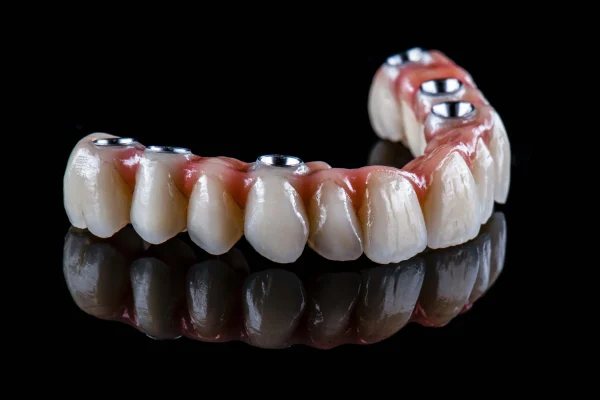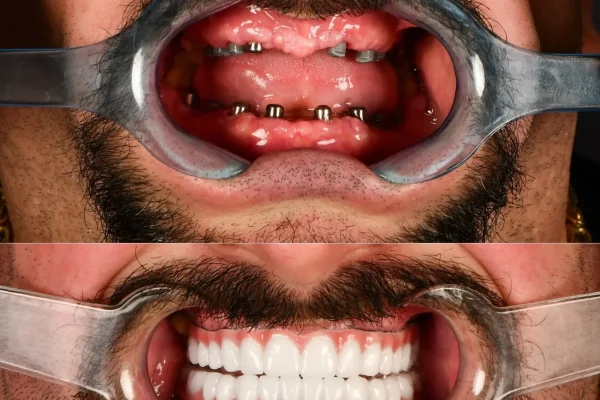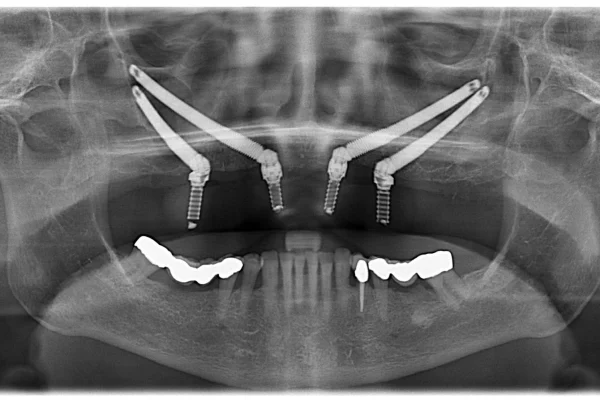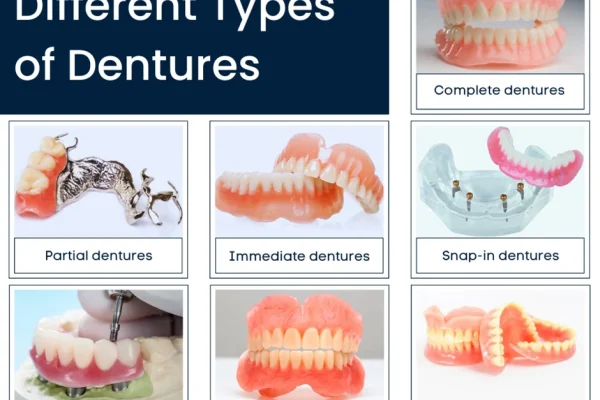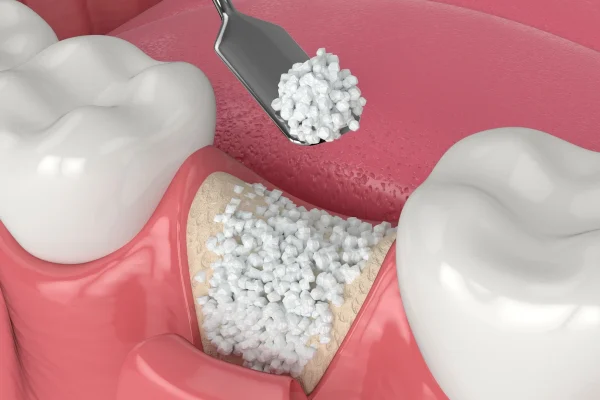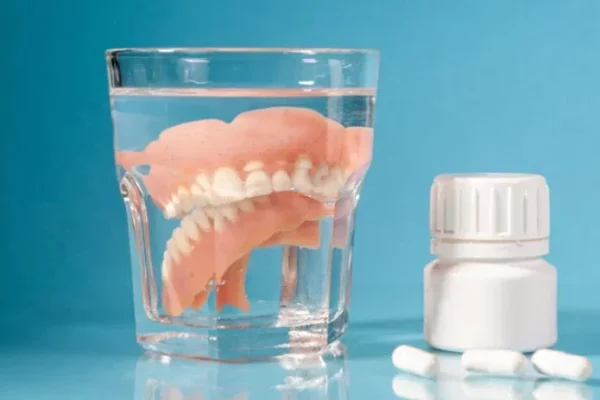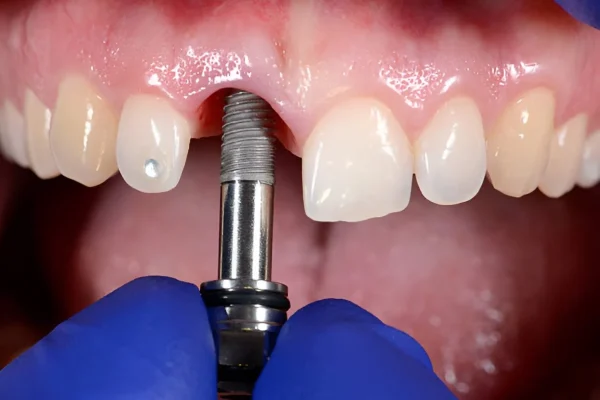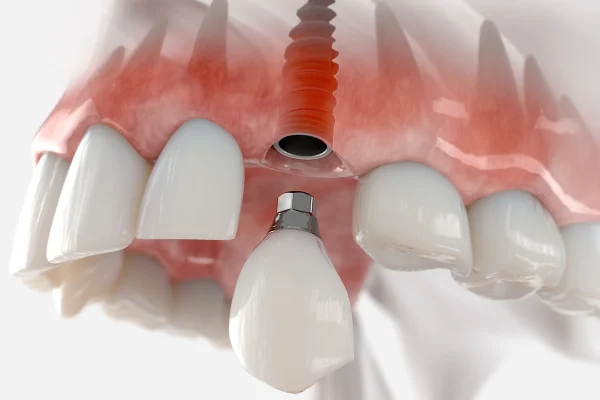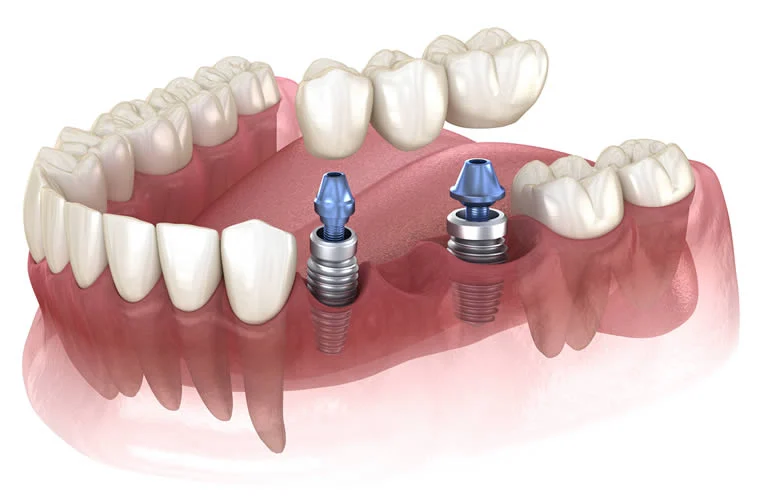
Table of Contents
ToggleKey Takeaways
- Cost Variation: Dental implant costs in the UK for 2025 vary significantly, with single implants typically ranging from £2,000 to £3,500, and full mouth solutions potentially costing £15,000 to £30,000+ per arch, influenced by complexity, materials, and clinic.
- NHS Availability: Dental implants are not routinely available on the NHS in the UK and are generally reserved for specific, severe clinical cases. Most patients will need to consider private treatment.
- Treatment Process: The UK dental implant process is a meticulous, multi-stage journey, including initial consultation and planning, surgical implant placement, a healing period for osseointegration, abutment placement, and fitting of the final custom-made restoration.
- Patient Experience & Longevity: The procedure is managed for comfort with local anaesthesia (and sedation options). Post-operative discomfort is usually mild and manageable. With proper care, dental implants can last for many years, often a lifetime.
- UK Clinic Advantages: Choosing a UK clinic provides benefits such as adherence to stringent safety and regulatory standards (e.g., CQC), straightforward continuity of care, easier communication, and accessible legal recourse if needed.
- Alternatives Exist: More affordable alternatives like removable dentures or traditional fixed bridgework are available in the UK, though they have different functional outcomes and long-term implications compared to implants
Understanding Dental Implants UK: What Are They and How Can They Restore Your Smile?
Let’s get to the nuts and bolts, or rather, the titanium posts and porcelain crowns. What exactly are these dental implants everyone’s talking about across the UK? Imagine a tiny, incredibly strong, biocompatible screw – typically crafted from medical-grade titanium. This isn’t just any screw; it’s an artificial tooth root, designed to be surgically, yet gently, placed into your jawbone where a tooth once stood. Think of it as laying the most solid foundation imaginable for a new tooth. Its purpose is elegantly simple yet profoundly effective: to act as an anchor. Once integrated with your bone (a fascinating process called osseointegration, where bone literally fuses with the titanium), this implant provides a sturdy base for a replacement tooth. This could be a single crown, a bridge supporting multiple teeth, or even a full set of dentures, transforming them from wobbly inconveniences into secure, confident smiles. The benefits? They’re manifold and genuinely transformative. We’re talking a significant boost in appearance, obviously, but also clearer speech (no more slurring or mumbling due to ill-fitting dentures), enhanced comfort (they feel like your own teeth), the joy of eating virtually anything without worry, a surge in self-esteem, and critically, improved long-term oral health by preserving jawbone and preventing adjacent teeth from shifting. This isn’t just “teeth replacement UK”; it’s a comprehensive smile and function restoration. The “UK dental implants” scene is robust, with “dental implants England” leading a charge of excellence. You’ll find “implants uk” widely available, from “dental implants London (Harley Street)” where pioneering techniques are often showcased, to accessible, highly skilled “dental implants in uk” clinics nationwide. These aren’t just “tooth implant uk” solutions; they represent a sophisticated approach to dental rehabilitation. Specialist clinics across the UK are equipped with cutting-edge technology and expertise, offering a broad spectrum of “dental implants UK treatment options.” Whether you need a “single & full teeth implants” solution, the “best dental implants treatment UK” is within reach. Indeed, many establishments vie for the title of “No.1 Dental Implants – Voted Best Dental Practice in UK,” pushing standards ever higher. From “expert dental implants in Harley Street” designed to “restore your smile today” to comprehensive services offered by groups like “Dental Implants | Teeth Implants by mydentist,” “Your London Dental Implant Specialist” is out there, ready to tailor a plan. The treatment options, which we’ll delve into more deeply, range from replacing a solitary missing tooth to full mouth reconstructions, ensuring a bespoke solution for almost any scenario.
How Much Do Dental Implants Cost in the UK for 2025?
Ah, the million-dollar question – or rather, the few-thousand-pound question, depending on your needs. “How much does a dental implant cost in the UK?” It’s the query on everyone’s lips, and the honest answer is: it varies. Considerably. Think of it like buying a car; a basic runaround won’t set you back as much as a luxury vehicle with all the bells and whistles. Similarly, the “average cost of dental implants in the UK” is a ballpark figure, influenced by a constellation of factors. So, what makes the price tag fluctuate? Firstly, the number of implants you require is a primary driver. A single tooth replacement will naturally be less than a full arch. Then there’s the type of implant and the materials used – premium brands or specific designs might carry a higher cost. The experience and reputation of your dentist and their team play a part; a seasoned implantologist with a track record of complex cases may command higher fees, but often brings invaluable expertise. Clinic location matters too; overheads in central London, for instance, can be higher than in a smaller town. Crucially, any additional procedures necessary to prepare your mouth for implants will add to the bill. This could include bone grafts if you’ve insufficient jawbone density, or sinus lifts for upper jaw implants. Understanding “how much are dental implants? (UK Prices)” involves looking beyond a simple per-implant figure. Always seek transparency in pricing. A reputable clinic will provide a detailed, itemised cost breakdown after a thorough consultation. Don’t be shy; ask precisely what’s included in the quoted price – does it cover the implant, the abutment (the connector piece), the final crown or bridge, surgical fees, follow-up appointments, and any necessary imaging? Many patients find resources like a “Dental Implant Cost Guide 2025 (UK Prices)” or “The Cost of Dental Implants in the UK (2025 Prices)” incredibly helpful starting points. Keep an eye out for updated information, such as “How Much Do Dental Implants Cost (UK 2025 Prices)” or a “How Much Are Dental Implants in the UK? (2025 Price Guide)” to get a contemporary perspective on potential investment. This initial research will arm you with the knowledge to ask pertinent questions and better understand the quotations you receive, ensuring no nasty surprises down the line.
How Much Do Dental Implants Cost in Albania for 2025?
Average Dental Implant Costs in Albania (2025)
| Treatment Type | Average Cost (EUR) | Details |
|---|---|---|
| Single Titanium Implant | €279 – €460 | Includes implant, abutment, and crown. |
| Single Zirconia Implant | €850 – €1,000 | Metal-free option, includes abutment and crown. |
| All-on-4 Full Arch Restoration | €1,799 – €4,200 | Fixed bridge supported by 4 implants. |
| All-on-6 Full Arch Restoration | €3,100 – €5,500 | Enhanced stability with 6 implants. |
| All-on-8 Full Arch Restoration | €4,500 – €6,500 | Maximum support with 8 implants. |
| Bone Grafting (if needed) | €150 – €400 | Augments jawbone for implant support. |
| Sinus Lift (if needed) | €300 – €700 | Elevates sinus floor for upper jaw implants. |
Why Choose Albania for Dental Implants?
Significant Cost Savings: Up to 70% less than prices in the UK or Western Europe.
High-Quality Care: Clinics use internationally recognized implant brands like Straumann and Nobel Biocare.
Experienced Professionals: Many dentists have international training and certifications.
Comprehensive Packages: Some clinics offer packages that include accommodation, airport transfers, and consultations.
Tourism Opportunities: Combine dental treatment with exploring Albania’s rich culture and scenic landscapes.
Additional Considerations
Treatment Duration: Typically, the implant process requires two visits spaced 3–6 months apart.
Immediate Load Implants: Available in certain cases, allowing for quicker restoration.
Warranty: Many clinics offer warranties on implants and prosthetics; inquire about specifics.
Aftercare: Ensure the clinic provides clear aftercare instructions and support.
What is the Price for a Single Tooth Implant in the UK?
When you’re looking to replace a single missing tooth, a dental implant offers the most natural and durable solution. So, “how much does a single dental implant cost UK?” or, more specifically, “how much does a single tooth implant cost in the UK?” For 2025, you’re generally looking at an estimated cost range starting from around £2,000 to £3,500, and sometimes higher, for a complete single tooth replacement. This figure typically encompasses the titanium implant itself (the part that goes into the jawbone), the abutment (the connector piece that sits on top of the implant), and the final porcelain crown (the visible tooth part). However, it’s crucial to reiterate that this is an average and can swing quite significantly based on the factors we’ve previously discussed. For instance, if your case is straightforward, requiring no preliminary bone grafting or sinus augmentation, you might find yourself at the lower end of this spectrum. Conversely, if you opt for a premium implant system from a world-renowned manufacturer, or if your treatment is performed by a highly specialised clinician in a prime city location like Harley Street, the costs could edge towards the upper limit or even exceed it. Furthermore, the type of crown material chosen can also influence the price; a standard porcelain-fused-to-metal crown might be more cost-effective than an all-ceramic or zirconia crown, which offer superior aesthetics. Always ensure the quotation you receive clearly itemises these components. Some clinics might quote an all-inclusive price, while others may break it down. Understanding this will help you compare like-for-like if you’re seeking opinions from multiple practices. Remember, this is an investment not just in a tooth, but in your overall oral health, confidence, and quality of life. While the upfront cost may seem substantial, the longevity and benefits of a well-placed single dental implant often make it a more cost-effective solution in the long run compared to alternatives that may require more frequent replacement or adjustment.
What is the Average UK Price for Full Dental Implants?
Addressing the “average UK price for full dental implants” requires acknowledging the inherent complexity and bespoke nature of such extensive treatment. When we talk about full mouth dental implants, we’re entering a realm of comprehensive oral rehabilitation, often involving sophisticated techniques like “All-on-4” or “All-on-6,” where an entire arch of teeth is supported by a strategically reduced number of implants, or perhaps a full set of implant-supported dentures. The cost for these transformative procedures is, understandably, significantly higher than for a single implant. For 2025 in the UK, patients considering full mouth dental implants could be looking at a price range anywhere from £15,000 to £30,000 per arch, and potentially more for complex cases or those utilising the most advanced materials and technologies. If both upper and lower arches require treatment, you could be looking at doubling these figures. The significant variation in cost for full mouth solutions is amplified by factors such as the specific technique employed (e.g., All-on-4 might have a different cost profile to a solution requiring more individual implants), the type and brand of implants used, the material chosen for the final prosthetic teeth (e.g., high-grade acrylic, composite, or porcelain), and whether any extensive preparatory work like significant bone grafting or multiple extractions are needed. The clinician’s expertise in handling such large-scale cases is also a vital component of the cost, reflecting years of specialised training and experience. Given the substantial investment involved, the importance of a detailed, personalised consultation cannot be overstated. This initial assessment is where your dentist will conduct a thorough examination, including advanced imaging like CT scans, to determine your suitability, discuss your aesthetic and functional goals, and outline a precise treatment plan with a comprehensive cost breakdown. Don’t hesitate to ask about finance options, as many clinics offer payment plans to help make this life-changing treatment more accessible. While the figures might seem daunting, the impact of full mouth dental implants on an individual’s ability to eat, speak, and smile with confidence is often described as priceless by those who undergo the treatment.
Why Are Dental Implants So Expensive in the UK Compared to Other Options or Locations?
The question of “why are dental implants so expensive in UK?” or “why do dental implants cost more in the UK?” is a common and valid one. It’s not an arbitrary pricing strategy; several genuine factors contribute to the cost structure in the United Kingdom. Firstly, the quality of materials used is paramount. Reputable UK clinics insist on using high-grade, biocompatible titanium alloys from trusted, well-researched manufacturers for the implants themselves, and top-quality ceramics or other materials for the restorations. These materials are not cheap, but they ensure longevity, safety, and optimal integration with your body. Secondly, the advanced technology involved in modern implant dentistry is a significant investment for clinics. This includes sophisticated diagnostic tools like 3D cone-beam CT scanners for precise planning, computer-guided surgical systems, and in-house or high-end dental laboratories equipped to craft bespoke prosthetics. The laboratory fees for creating custom-made crowns, bridges, or dentures that perfectly fit and match your natural teeth are also a considerable component. Furthermore, the training and expertise of the clinicians performing implant surgery are extensive. Dentists specialising in implantology undergo years of post-graduate education and continuous professional development to master complex surgical and restorative techniques. This high level of skill and experience commands a professional fee reflective of their expertise. Regulatory standards in the UK are also stringent, ensuring patient safety and quality of care, but compliance with these regulations (such as those set by the Care Quality Commission in England) involves operational costs for clinics. Finally, general business overheads, including clinic rent (especially in desirable locations), staff salaries, insurance, and utilities, are all factored into the final price. While the upfront cost may seem higher than some traditional alternatives like dentures or bridges, it’s crucial to consider the value proposition. Dental implants are designed to be a long-term, often permanent, solution. They prevent bone loss, protect adjacent teeth, and offer unparalleled stability and function. When viewed as a long-term investment in your oral health, confidence, and quality of life, the cost often represents excellent value compared to alternatives that may require more frequent replacements or lead to other dental complications down the line.
Can You Find Low-Cost Dental Implants in the UK, Perhaps Comparable to Travelling Abroad?
The allure of “low cost dental implants UK” is understandable, especially when faced with the typical price ranges. And yes, there are avenues to explore if you’re seeking more affordable options within the UK, potentially even finding prices that some might consider “comparable to travel abroad,” as suggested by phrases like “Low Cost Dental Implants UK | Comparable to Travel Abroad Milton Keynes.” One potential route is to investigate treatment at dental hospitals or university dental schools. Here, procedures may be carried out by postgraduate students under the close supervision of experienced consultants, often at a reduced cost. Waiting lists can be long, and not all cases may be suitable, but it’s an option worth exploring. Some larger dental chains or clinics situated outside major city centres might also offer more competitive pricing due to lower overheads or different business models. Payment plans and dental finance options are widely available across many UK practices, which, while not reducing the overall cost, can make the treatment more manageable by spreading payments over time. However, a significant word of caution is essential when encountering offers that seem “too good to be true.” While genuine value can be found, drastically cheaper options may sometimes cut corners on material quality, technology, clinician experience, or aftercare. It’s vital to conduct thorough research. Ask probing questions: What brand of implants is being used? What are the clinician’s qualifications and experience with implants? What is included in the aftercare? Are there any hidden costs? The initial quote for treatment abroad might seem lower, but when you factor in travel, accommodation, time off work, and potentially more complex or costly follow-up care if complications arise back in the UK, the overall financial and personal cost can escalate. Some UK clinics position themselves as providing excellent value, aiming to bridge this gap by offering high-quality treatment at more accessible price points, without the risks and logistical challenges associated with dental tourism. The key is to balance cost with quality, safety, and the assurance of ongoing local care.
Are Dental Implants Available on the NHS in the UK?
This is a frequent and important question: “Can you get dental implants on NHS?” or “Are Dental Implants Available on the NHS?” The straightforward answer is that dental implants are not routinely available on the National Health Service in the UK, particularly if the primary reason for wanting them is cosmetic. The NHS provides dental treatments that are clinically necessary to maintain oral health, and while missing teeth certainly impact health and function, the primary solutions offered are typically dentures or bridges. “Are Dental Implants an Option on the NHS?” Yes, but only in very specific and limited circumstances. NHS funding for dental implants is subject to strict clinical criteria, and eligibility is not widespread. The focus of NHS dental provision is to ensure a baseline level of dental health for the population, and complex, higher-cost treatments like implants are generally reserved for cases where other conventional treatments are not suitable or have failed, and where there’s a significant medical or functional need. Before even considering implants, the NHS will typically explore and offer clinically necessary alternative treatments, such as removable dentures or traditional fixed bridgework, which are effective for many patients in restoring function and aesthetics to a satisfactory level. The decision-making process for NHS-funded implants involves rigorous assessment and often requires referral to a hospital setting, where consultants will evaluate the case based on established national and local guidelines. Therefore, for the vast majority of patients seeking dental implants in the UK, private treatment is the standard route. This ensures access to a wider range of implant systems, advanced technologies, and often, more immediate treatment timelines without the constraints of NHS waiting lists or funding limitations. While the NHS plays a crucial role in UK dental health, its capacity to provide dental implants is, by necessity, carefully managed and restricted.
Who Qualifies for Free or NHS-Funded Dental Implants in the UK?
The burning question for many is, “Who qualifies for free dental implants UK?” or, more accurately, NHS-funded implants, as “free” often implies no charge at all, whereas standard NHS patient charges may still apply unless an individual is exempt. Qualification for NHS dental implants is not a simple checklist; it’s based on stringent clinical criteria and is often at the discretion of the local NHS trust’s funding policies, following assessment by an NHS consultant. Generally, NHS implants are reserved for patients who have specific medical conditions or circumstances where implants are deemed the only viable long-term solution and where their absence causes significant functional or psychological issues. Examples of such conditions or circumstances might include patients who have lost teeth due to severe trauma, such as a serious accident affecting the face and jaw. Individuals born with developmental issues leading to congenitally missing teeth (hypodontia) or other craniofacial anomalies might also be considered. Furthermore, patients who have undergone extensive surgery for mouth or jaw cancer, resulting in significant tissue and tooth loss, could qualify if implants are essential for reconstructing their ability to eat, speak, or for the retention of a prosthesis. It’s important to understand that even in these scenarios, qualification is not automatic. The assessment process is thorough. It typically involves a referral from a general dental practitioner or a medical specialist to a hospital-based consultant in restorative dentistry or oral and maxillofacial surgery. This consultant will evaluate the patient’s overall oral health, the specific nature of their tooth loss, the condition of their jawbone, and whether alternative treatments like sophisticated dentures or bridges would be inadequate. Local NHS commissioning groups also have their own policies and funding priorities, which can influence availability. So, while the criteria are narrow, for those with compelling clinical needs that cannot be met by conventional means, NHS-funded dental implants can be a lifeline.
What Should You Know About NHS Dental Implants from Trusts Like Guy’s and St Thomas’?
When considering NHS dental implants, particularly through renowned institutions like “Guy’s and St Thomas’ NHS Foundation Trust,” it’s important to understand the process and what to expect. Access to such specialised services, as highlighted in their “Dental implants – Overview,” invariably begins with a referral. Your general dental practitioner or another healthcare professional must refer you to a hospital department or a specialist service if they believe you might meet the strict criteria for NHS-funded implants. These trusts are centres of excellence, often dealing with complex cases, and their consultants are at the forefront of dental implantology. However, this also means demand is high. Even if you are deemed eligible, potential waiting times can be significant, often much longer than if you were to pursue treatment privately. The scope of treatment available under the NHS might also be more limited compared to private options. While the quality of care is excellent, the NHS must manage its resources carefully. This might mean that certain premium implant brands, advanced cosmetic materials for crowns, or ancillary procedures that are desirable but not strictly clinically essential might not be offered. Information regarding “Dental implants – After having a dental implant | Guy’s and St Thomas’ NHS” will stress the importance of meticulous aftercare, which is universal, but the pathway for managing any complications or long-term maintenance will be within the NHS framework. A key consideration is the “Dental implants – NHS vs private practice” comparison. Privately, you have greater choice over the clinician, the specific type of implant system, the materials used for your final teeth, and often, more flexibility in scheduling appointments. The cost is, of course, borne by you. Within the NHS, the cost to the patient (if not exempt from charges) will be considerably lower, but this comes with less choice and potentially longer waits. Understanding these differences is crucial when exploring your options for dental implant treatment in the UK, allowing you to make an informed decision based on your priorities, clinical needs, and financial circumstances.
What Scope of Dental Implant Treatments Can You Get in the UK, from Single Tooth to Full Mouth?
The scope of dental implant treatments available in the UK is impressively broad, catering to a vast array of tooth loss scenarios with remarkable versatility. Whether you’re missing a single tooth due to an unfortunate sporting incident, multiple teeth scattered across your arches, or are facing complete tooth loss (edentulism), modern implant dentistry in the UK offers a sophisticated and tailored solution. The days of “one-size-fits-all” dental restorations are long gone. Today, treatment plans are highly customized, meticulously designed around your unique anatomical structures, functional requirements, and aesthetic aspirations. UK dental clinics, particularly those specialising in implantology, are often equipped with cutting-edge technological advancements that enhance every stage of the process. This includes high-resolution 3D cone-beam CT (CBCT) scanners for unparalleled diagnostic clarity and precise planning of implant placement, intraoral scanners that create digital impressions without the need for messy traditional moulds, and computer-aided design/computer-aided manufacturing (CAD/CAM) technology for crafting incredibly accurate and lifelike crowns, bridges, and dentures. This technological prowess allows for predictable outcomes and often, more comfortable patient experiences. From the replacement of an individual incisor, canine, or molar, ensuring it blends seamlessly with your natural dentition, to complex full-mouth reconstructions that can restore an entire smile and dramatically improve quality of life, the spectrum of care is comprehensive. Specialist implant dentists in the UK are skilled in various techniques, including immediate implant placement (where an implant is placed at the same time as a tooth extraction), bone grafting procedures to augment insufficient jawbone, and sinus lifts for creating adequate bone height in the upper jaw. This comprehensive approach ensures that even patients with challenging clinical situations can often be successfully treated with dental implants, achieving results that look, feel, and function just like natural teeth. The goal is always to provide a durable, stable, and aesthetically pleasing outcome that enhances both oral health and overall well-being.
Can I Have All My Teeth Removed and Replaced with Full Mouth Dental Implants in the UK?
Yes, absolutely. The answer to “Can I have all my teeth removed and replaced with implants in the UK?” is a resounding yes, for suitable candidates. This type of transformative procedure, often referred to as full arch or full mouth dental implant rehabilitation, is a well-established and highly successful treatment option offered by many experienced implant clinics across the United Kingdom. It’s designed for individuals who have lost all their teeth in one or both jaws, or for those whose remaining teeth are failing and require extraction. The concept of “Full Mouth Dental Implants in London – Dentaprime UK” or achieving “Full Arch Dental Implants in Leeds – Same Day Teeth Infinity Dental” (to reference the types of services available) is a reality for many. There are several ways to achieve a full mouth restoration with implants. One popular approach involves supporting a full arch fixed bridge (a complete set of prosthetic teeth) on a strategically placed number of implants – commonly four (as in “All-on-4”), six, or sometimes more, depending on bone quality and the specific design of the prosthesis. Another option is implant-retained or implant-supported dentures, where implants provide secure anchorage for a removable denture, dramatically improving its stability and comfort compared to traditional dentures. Before embarking on such a comprehensive treatment, a thorough assessment is crucial. This will involve detailed discussions about your dental and medical history, clinical examinations, and advanced imaging like CT scans to evaluate your jawbone density and structure. Considerations such as your overall health, bone volume (though grafting procedures can often address deficiencies), and your commitment to oral hygiene post-treatment are all important factors. While it’s a significant undertaking, the results can be life-changing, restoring not just a full set of functional teeth but also facial support, confidence, and the ability to enjoy a wide variety of foods without restriction. UK clinics offering these advanced solutions typically have multidisciplinary teams and state-of-the-art facilities to manage these complex cases effectively.
Are Single-Tooth Implants a Common Option in the UK?
Indeed, single-tooth implants are an exceedingly common and highly effective treatment option in the UK, widely regarded by dental professionals as the gold standard for replacing an individual missing tooth. Their popularity stems from their numerous advantages over traditional alternatives like tooth-supported bridges or partial dentures. When you lose a single tooth, whether it’s due to decay, gum disease, injury, or congenital absence, a single dental implant provides a standalone solution that doesn’t compromise the health of adjacent teeth. As the statement “Single-tooth implants in the UK are an investment in your oral health…” rightly suggests, they offer significant long-term benefits. Unlike a traditional bridge, which requires the neighbouring teeth to be ground down to support the prosthetic, a single implant is placed directly into the site of the missing tooth root, leaving the adjacent natural teeth untouched and intact. This is a major conservative advantage. The implant then acts as an artificial root, and once it has integrated with the jawbone, a custom-made crown is attached, perfectly matched in shade and shape to your surrounding teeth. The result is a replacement that looks, feels, and functions just like a natural tooth. Patients often report that they forget they even have an implant. Furthermore, the presence of the implant helps to preserve the jawbone in that area, preventing the bone resorption (shrinkage) that naturally occurs when a tooth root is missing. This helps maintain facial structure and supports the surrounding teeth and gums. Given these clear benefits – preservation of adjacent teeth, bone maintenance, natural aesthetics, and excellent long-term success rates – it’s no surprise that single-tooth implants are a cornerstone of modern restorative dentistry in the UK, offered by general dentists with advanced training in implantology as well as specialist implant clinics.
What Are All-on-4 Dental Implants and Are They Widely Offered in the UK?
“All-on-4” dental implants represent an innovative and highly sought-after solution for individuals who have lost, or are about to lose, all their teeth in an entire arch (upper or lower jaw). And yes, this technique, along with similar concepts like “All-on-6,” is widely offered by many specialist and advanced dental clinics across the UK. You’ll find clinics like “All on 4 Dental Implants Croydon | Smile 4 U Dental Practice” promoting this specific service, indicating its availability. The All-on-4 concept, pioneered by Dr. Paulo Malo, is quite ingenious: it involves supporting a full arch of fixed prosthetic teeth on just four strategically placed dental implants. Typically, the two anterior (front) implants are placed vertically, while the two posterior (back) implants are tilted. This angulation is key; it often allows for the use of longer implants, provides better bone-to-implant contact, and critically, can help to avoid anatomical structures like nerves in the lower jaw or sinuses in the upper jaw. One of the significant benefits of the All-on-4 technique is that it can frequently negate the need for extensive bone grafting procedures, even in patients who have experienced some degree of bone loss. This can shorten overall treatment time and reduce costs compared to approaches requiring more implants and grafting. Often, patients can receive a provisional (temporary) set of fixed teeth on the same day as the implant surgery, leading to the popular term “teeth in a day.” This immediate improvement in function and aesthetics is a major draw for many. While All-on-4 is a fantastic option for suitable candidates, a thorough assessment by an experienced implant dentist is essential to determine if it’s the optimal approach for your specific clinical situation, bone quality, and long-term goals. UK clinicians offering this treatment are typically highly trained and utilise advanced planning software to ensure precise implant placement and predictable outcomes.
What is The Dental Implant Treatment Process Like in the UK, Step-by-Step?
Embarking on the dental implant journey in the UK generally follows a well-defined, multi-stage process, designed for safety, efficacy, and optimal outcomes. While individual experiences may vary slightly, the core steps are consistent across reputable clinics, such as those detailing “The Dental Implant Treatment Process: Step-by-Step at Our Harley Street Clinic.” It all begins with the Initial Consultation and Planning phase. This is arguably one of the most crucial stages. Here, you’ll have a detailed discussion with your implant dentist about your concerns, desired outcomes, and medical/dental history. A comprehensive dental examination will be performed, often supplemented by advanced imaging like X-rays and, increasingly, 3D Cone Beam CT (CBCT) scans. These scans provide intricate detail of your jawbone structure, nerve pathways, and sinus cavities, allowing for meticulous planning. Your dentist will then present you with suitable treatment options, discuss the pros and cons, and collaboratively create a personalised treatment plan, including a full cost breakdown. The next major step is the Implant Placement Surgery. This is typically carried out under local anaesthesia, ensuring you’re comfortable and pain-free, though sedation options are often available for anxious patients. The dentist will make a small incision in the gum to access the jawbone, prepare the site, and then carefully place the titanium implant(s). The gums are then usually stitched closed. You might experience some swelling or mild discomfort afterwards, manageable with standard pain relief. Following surgery is the vital Osseointegration Period. This is a healing phase where nature takes its course. Over several weeks to months (typically 3-6 months, but it varies), the jawbone grows around and fuses with the titanium implant, creating a super-strong, stable foundation. You’ll likely have temporary restorations during this time if you’re in a visible area. Once osseointegration is successful, the next step might be Abutment Placement. The abutment is a small connector post that attaches to the implant and protrudes just above the gum line, serving as the base for your new tooth. Sometimes, the abutment is placed during the initial implant surgery; other times, it requires a minor secondary procedure. Finally, comes the Restoration Phase. This involves taking impressions (either digitally or with traditional moulds) of your mouth and the abutment. These are sent to a dental laboratory where your custom crown, bridge, or denture is meticulously crafted to match your natural teeth in colour, shape, and size. Once ready, your dentist will fit and secure your new restoration onto the abutment(s), making any necessary adjustments for a perfect fit and comfortable bite. The journey doesn’t end there; Aftercare and Follow-up are paramount. Your clinic will provide detailed instructions on how to care for your new implants, which essentially involves the same excellent oral hygiene as natural teeth – regular brushing, flossing, and routine dental check-ups to ensure the long-term health and success of your implants.
What is the Patient Experience with Dental Implants in the UK Regarding Pain and How Long Do They Last?
When considering dental implants in the UK, prospective patients understandably have two primary concerns beyond cost: how much discomfort is involved, and what is the longevity of the treatment? Managing expectations around these aspects is key to a positive patient journey. It’s important to remember that dental implant placement is a surgical procedure, but modern techniques and anaesthesia have made it far more comfortable than many imagine. Reputable UK clinics prioritise patient comfort and provide comprehensive post-procedure care instructions to ensure a smooth recovery. This typically includes advice on managing swelling (ice packs are your friend!), dietary recommendations for the initial healing period (soft foods to start), and prescribed or over-the-counter pain relief to manage any discomfort. Clear communication about what to expect at each stage helps alleviate anxiety and empowers patients. Equally, understanding the factors that contribute to the long-term success of dental implants is crucial. While implants have an exceptionally high success rate, they are not a “fit and forget” solution. They require the same diligent care as natural teeth, if not more so. Regular dental check-ups and hygiene appointments allow your dental team to monitor the health of your implants, the surrounding gums, and the integrity of the restorations. They can identify and address any potential issues early on, long before they become significant problems. Patients are often surprised by how quickly they adapt to their new implants, reporting that they feel just like their own teeth, allowing them to eat, speak, and smile with renewed confidence and freedom. The overall patient experience is generally very positive, with most individuals stating the benefits far outweigh any temporary inconvenience or discomfort associated with the procedure.
How Painful is the Dental Implant Procedure in the UK?
The question, “How painful are dental implants UK?” is a very common and understandable concern. The good news is that, for most patients, the dental implant procedure itself is significantly less uncomfortable than they anticipate. During the actual surgical placement of the implant(s), you will be under local anaesthesia, which completely numbs the area being treated. This means you should not feel any pain during the surgery itself, though you might be aware of some pressure or vibrations, similar to other dental procedures like fillings. Many UK clinics also offer various forms of sedation, from oral sedatives to IV sedation administered by a trained professional, for patients who are particularly anxious or undergoing longer procedures. This can help you feel completely relaxed and at ease, with little to no memory of the procedure afterwards. Following the surgery, once the anaesthesia wears off, some level of post-operative discomfort is to be expected – this is a natural part of the healing process. Patients typically describe this as mild to moderate tenderness, swelling, and possibly some bruising in the treated area and surrounding tissues. This discomfort is usually most noticeable in the first few days after the procedure and is generally well-managed with standard over-the-counter pain relief medications like ibuprofen or paracetamol. Your dentist may also prescribe stronger pain relief if deemed necessary. Applying ice packs to the affected area can also significantly help reduce swelling and discomfort. It’s important to note that pain perception varies greatly from person to person; what one individual finds mildly uncomfortable, another might find more challenging. However, the vast majority of patients report that any post-operative pain is manageable and subsides within a few days to a week. Adhering strictly to your dentist’s post-operative care instructions is crucial for a smooth and comfortable recovery. Most patients are pleasantly surprised by how little pain they experience overall.
How Long Does a Dental Implant Typically Last When Done in the UK?
When investing in dental implants in the UK, a key question is, “How long does a dental implant last in the UK?” The longevity of dental implants is one of their most significant advantages, with success rates being remarkably high. Well-placed and properly cared-for dental implants can, and often do, last for many years – potentially even a lifetime. Numerous long-term studies have shown success rates upwards of 90-95% over 10 years, and many implants continue to function perfectly well for 20 years or more. The implant itself, the titanium post that integrates with the jawbone, is designed to be a permanent fixture. However, several factors can influence this impressive lifespan. The most critical factor is meticulous oral hygiene. Just like natural teeth, implants and the surrounding gums need to be kept scrupulously clean through regular brushing, flossing (or using interdental brushes), and attending routine dental check-ups and hygiene appointments. Gum disease (peri-implantitis, an infection around the implant) is one of the primary threats to implant longevity. Regular professional cleanings and monitoring by your UK dental team are essential to prevent or manage this. Other factors affecting implant lifespan include your overall health – conditions like uncontrolled diabetes or osteoporosis can impact healing and bone health. Lifestyle choices, particularly smoking, can significantly compromise implant success rates and longevity by impairing healing and increasing the risk of infection. The skill and experience of the dentist placing the implant and designing the restoration also play a vital role. It’s also important to differentiate between the implant fixture and the restoration (the crown, bridge, or denture) attached to it. While the implant itself can last for decades, the prosthetic tooth or teeth may experience wear and tear over time, just like natural teeth or any other dental restoration. Therefore, the crown or bridge component might need replacement after, say, 10-15 years, though this can also vary widely depending on the material used and the biting forces it’s subjected to. With good care and regular maintenance in a UK dental practice, your dental implants stand an excellent chance of providing you with a durable, functional, and aesthetic smile for many, many years.
Is There a Cheaper Alternative to Dental Implants Available in the UK?
The question “Is there a cheaper alternative to dental implants in the UK?” is one that many people ponder, especially given that implants represent a significant financial investment. And yes, there are indeed more budget-friendly options available for replacing missing teeth, though it’s crucial to understand that these alternatives come with their own set of pros and cons compared to the comprehensive solution offered by implants. Acknowledging cost concerns is important; not everyone is in a position to opt for implants immediately, or they may not be suitable for other clinical reasons. The most common traditional alternatives offered in UK dental practices are removable dentures (either full, replacing all teeth in an arch, or partial, replacing a few missing teeth) and fixed bridges. Dentures are generally the most affordable option upfront. They consist of prosthetic teeth set into an acrylic or metal base that rests on the gums. While modern dentures are far more sophisticated than those of previous generations, they can sometimes feel bulky, may affect taste or speech initially, and can occasionally slip or cause sore spots if not perfectly fitted. They also don’t prevent the underlying jawbone from gradually resorbing (shrinking) over time. Fixed bridges, on the other hand, are used to replace one or more missing teeth by ‘bridging’ the gap. This involves placing crowns on the natural teeth on either side of the space, with a prosthetic tooth (or teeth) fused between them. Bridges are more stable than dentures and feel more like natural teeth. However, a key disadvantage is that healthy adjacent teeth often need to be significantly ground down to accommodate the supporting crowns, which can compromise their long-term health. Each alternative has its place, and your UK dentist can discuss which might be most appropriate for your clinical needs, lifestyle, and budget, ensuring you understand the benefits and limitations of each before making a decision.
How Do Fixed Teeth Serve as an Alternative to Dentures in the UK?
When patients in the UK are looking for an alternative to removable dentures, particularly if they desire more stability and a less cumbersome solution, “fixed teeth” often come into the conversation. It’s important to clarify what “fixed teeth” means in this non-implant context. Typically, this refers to traditional fixed bridgework, which is cemented onto existing natural teeth. The concept, as hinted at by phrases like “EvoDental – How are fixed teeth the perfect alternative to dentures?” (though EvoDental themselves are known for implant solutions, the underlying patient desire for fixed alternatives is relevant), is to provide a non-removable solution. A traditional fixed bridge works by using healthy teeth on either side of a gap as anchors (abutments). These abutment teeth are prepared (reshaped by removing some enamel) to receive crowns. A prosthetic tooth (or teeth, known as a pontic) is then fused between these crowns, creating a single, solid unit that is cemented into place. Compared to removable dentures, fixed bridges offer several advantages. They provide significantly more stability for chewing and speaking, as they are permanently attached and don’t rely on suction or clasps for retention. They generally feel more natural in the mouth and are easier to adapt to. Aesthetically, well-made bridges can look very natural, blending seamlessly with the surrounding teeth. However, there are considerations. The most significant is that the preparation of abutment teeth is an irreversible procedure; healthy tooth structure is removed. If one of the abutment teeth subsequently develops a problem, the entire bridge may be compromised. Furthermore, cleaning under the pontic part of the bridge requires diligent oral hygiene to prevent food trapping and gum inflammation. Traditional bridges also do not address the issue of bone loss in the area of the missing tooth root, unlike dental implants. While fixed bridges are a well-established and effective alternative to dentures for suitable candidates, offering a more secure and often more comfortable experience, a thorough discussion with your UK dentist is essential to weigh their benefits against their limitations and compare them to other options like implants or even advanced, well-fitting dentures.
Why Should I Choose a UK Clinic for My Dental Implants Over Travelling Abroad?
The phenomenon of “dental tourism,” seeking treatment abroad often due to perceived lower costs, is well-documented. However, when it comes to a significant procedure like dental implants, asking “Why should I choose a UK clinic for my dental implants over one abroad?” is a critical consideration that goes far beyond the initial price tag. While the allure of saving money can be strong, opting for treatment within the UK offers numerous compelling advantages related to safety, quality, continuity of care, and legal recourse. The decision shouldn’t solely hinge on the initial quote but should encompass the entire patient journey, from pre-operative assessment to long-term aftercare and management of any potential complications. UK dental clinics operate under stringent regulatory frameworks, such as those enforced by the Care Quality Commission (CQC) in England, which mandate high standards for patient safety, hygiene, and clinical governance. Clinicians in the UK are registered with the General Dental Council (GDC) and are required to undertake continuous professional development, ensuring they are up-to-date with the latest techniques and best practices. Focusing on the overall value proposition, which includes peace of mind, accessibility for follow-up care, and the assurance of treatment from highly regulated professionals, often makes choosing a UK-based clinic the more prudent long-term decision. The convenience of local aftercare cannot be overstated; should any adjustments or complications arise, your UK dentist is readily accessible, avoiding the cost and inconvenience of further international travel. This holistic view, balancing cost with quality, safety, and comprehensive care, is vital when making such an important investment in your oral health.
How Does the Cost of Dental Implant Treatment Abroad Compare to Prices in the UK?
It’s undeniable that when you initially ask, “How does the cost of treatment abroad compare to the cost of implants in the UK?”, the headline prices advertised by many overseas clinics can appear significantly lower. Countries in Eastern Europe, Turkey, or parts of Asia often promote dental implant packages that, on paper, seem to offer substantial savings compared to average UK prices. This apparent cost saving is the primary driver for dental tourism. However, it’s crucial to dig deeper and conduct a true cost comparison. The advertised price for implants abroad might not include all necessary components or procedures. You need to meticulously check what is covered: Is it just the implant screw, or does it include the abutment, the final crown, any necessary bone grafting, sinus lifts, anaesthesia, and post-operative medications? Furthermore, the initial treatment cost is only one part of the equation. You must factor in the “hidden costs” associated with travelling abroad for treatment. These include return flights (and potentially multiple trips if the treatment is staged), accommodation for the duration of your stay (and possibly for a companion), travel insurance that specifically covers planned medical procedures (which can be more expensive), and the cost of taking time off work, not just for the treatment itself but also for travel and recovery. Language barriers can sometimes lead to misunderstandings about treatment plans or costs. More critically, if complications arise once you’re back in the UK, obtaining follow-up care can become complex and potentially very costly. Your local UK dentist may be hesitant or unable to treat complications arising from work done elsewhere, especially if different implant systems or techniques were used. You might find yourself needing to travel abroad again, incurring further expense and inconvenience, or seeking specialist care in the UK at a premium. Therefore, a comprehensive comparison should tally up all these associated expenses and potential future costs to determine if the perceived savings are genuine or merely an illusion.
What Are the Advantages of Opting for a UK-Based Dental Implant Clinic?
Choosing a UK-based clinic for your dental implants offers a multitude of advantages that contribute to peace of mind, quality of care, and long-term success. These “Advantages of Opting for a UK-based Clinic” and “Benefits Of Choosing A UK Clinic For Dental Implants” are significant and worth careful consideration. Firstly, Regulatory Standards and Safety are paramount. UK dental practices are rigorously regulated by bodies like the Care Quality Commission (CQC) in England, Health Inspectorate Wales, Regulation and Quality Improvement Authority (RQIA) in Northern Ireland, and Healthcare Improvement Scotland. These organisations enforce strict standards for hygiene, patient safety, equipment, and staff training. Dentists and dental care professionals are registered with the General Dental Council (GDC), which sets standards for education, ethics, and professional conduct. This robust regulatory environment provides a high level of assurance regarding the quality and safety of your treatment. Secondly, Continuity of Care and Aftercare is significantly more straightforward. Dental implant treatment often requires multiple appointments and long-term follow-up. Having your treatment performed locally means easy access to your dental team for all stages of the process, from initial consultation to final restoration and ongoing maintenance. Should any complications or issues arise, however minor, your UK clinic is readily available to provide prompt attention and appropriate care. This continuity is crucial for the long-term health of your implants. Thirdly, Clear Communication and Legal Recourse are enhanced. Being treated in your native language ensures clear understanding of complex treatment plans, consent processes, and aftercare instructions, minimising the risk of miscommunication. Furthermore, should you have any concerns or disputes regarding your treatment, the UK has established and accessible legal and complaints procedures through bodies like the Dental Complaints Service, providing a level of consumer protection that may be more challenging to navigate with overseas providers. Lastly, reputable UK clinics invest in High-Quality Materials and Advanced Technology, using well-researched implant systems from established manufacturers and adhering to best-practice protocols, ensuring you receive treatment that is both effective and durable. These combined factors often make choosing a UK clinic a more secure and ultimately more valuable decision for your dental health.
Frequently Asked Questions About ‘dental implants uk’
How Much Do Dental Implants Cost in the UK for 2025?
This is, understandably, a paramount concern for anyone considering dental implants in the UK for 2025. As we’ve discussed, the cost isn’t a fixed sum but rather a spectrum, influenced by a myriad of factors. For a single dental implant, encompassing the implant fixture, the abutment, and the final crown, patients in the UK can typically expect a range from approximately £2,000 to £3,500, sometimes extending higher for premium options or complex cases. If you’re looking at full mouth solutions, such as All-on-4 or implant-supported dentures, the investment is considerably larger, potentially ranging from £15,000 to £30,000 per arch, or even more depending on the specifics. Key variables impacting these figures include the number of implants required, the type and brand of implants chosen (some well-established international brands may carry a premium), the materials used for the final restorations (e.g., porcelain, zirconia, acrylic), the experience and specialisation of the clinician, the geographical location of the clinic (city centre practices often have higher overheads), and critically, whether any preparatory procedures like bone grafting or sinus lifts are necessary to ensure a stable foundation for the implants. It’s absolutely vital to obtain a detailed, itemised treatment plan and quotation from your chosen UK dental clinic after a thorough consultation and diagnostic assessment. This will clarify precisely what is included in the fee and help you avoid any unexpected expenses. Many UK clinics also offer finance plans to help spread the cost, making this transformative treatment more accessible. Remember, while cost is a significant factor, it should be weighed against the long-term benefits, durability, and improved quality of life that dental implants can offer.
Are Dental Implants Available on the NHS in the UK?
The question of NHS availability for dental implants in the UK is a common one, and the answer requires some nuance. In general, dental implants are not routinely provided on the NHS for the majority of patients. The NHS focuses on providing clinically necessary treatments to maintain oral health, and for missing teeth, this typically involves conventional solutions such as dentures or traditional bridges. However, dental implants can be an option on the NHS, but only under very specific and stringent clinical criteria. Funding is usually reserved for a small cohort of patients who have particular medical needs where implants are deemed the only viable long-term solution. This might include individuals who have experienced severe facial trauma, those with certain congenital conditions leading to missing teeth (like hypodontia), or patients who have undergone extensive surgery for oral cancer which has resulted in significant tooth and bone loss, making conventional prosthetics unworkable. Even in these cases, eligibility is not automatic and requires a thorough assessment by an NHS hospital consultant, often in restorative dentistry or maxillofacial surgery. The decision also depends on local NHS trust funding policies and priorities. Waiting lists for NHS-funded implants can be lengthy. Therefore, for most individuals in the UK seeking dental implants for reasons such as replacing teeth lost to decay, gum disease, or for primarily aesthetic improvement, private treatment is the standard and most accessible pathway. This route offers greater choice in terms of clinicians, implant systems, materials, and usually, more immediate treatment timelines compared to the limited NHS provision.
How Painful is the Dental Implant Procedure in the UK?
Concerns about pain during and after dental implant surgery are entirely natural, but modern dentistry in the UK has made significant strides in ensuring patient comfort. During the implant placement procedure itself, you will receive effective local anaesthesia, completely numbing the area being treated. This means you should not experience any pain during the surgery, although you might be aware of some sensations of pressure or vibration, akin to other dental work. For patients who feel particularly anxious, many UK clinics offer various sedation options, ranging from oral sedatives taken before the appointment to intravenous (IV) sedation administered by a trained professional. Sedation helps patients relax deeply and can make the experience much more comfortable, with many having little to no recollection of the procedure afterwards. Once the anaesthesia wears off post-surgery, some discomfort is to be expected as part of the natural healing process. This is typically described by patients as mild to moderate tenderness, soreness, or aching in the treated area, often accompanied by some swelling and possibly bruising. This discomfort is usually at its peak for the first few days and is generally well-managed with over-the-counter pain relievers like ibuprofen or paracetamol. Your dentist may prescribe stronger pain medication if necessary. Applying ice packs externally to the affected area can also be very effective in reducing swelling and alleviating discomfort. The level of pain experienced varies from individual to individual, but the vast majority of patients report that it is far less than they anticipated and is manageable. Strict adherence to post-operative care instructions provided by your UK dental clinic is key to a smooth and comfortable recovery, minimising pain and promoting optimal healing.
How Long Does a Dental Implant Typically Last When Done in the UK?
One of the most compelling attributes of dental implants performed in the UK is their impressive longevity and high success rates. When properly placed by a skilled clinician and meticulously cared for by the patient, dental implants have the potential to last for many years, often for a lifetime. Numerous extensive clinical studies conducted over decades have demonstrated success rates typically exceeding 90-95% over a 10-year period, with many implants continuing to function perfectly well for 20 years, 30 years, or even longer. The titanium implant fixture itself, which osseointegrates (fuses) with the jawbone, is designed to be a permanent and stable foundation. However, achieving this remarkable durability depends on several crucial factors. Paramount among these is exemplary oral hygiene. Dental implants, like natural teeth, require diligent daily care, including thorough brushing, flossing (or the use of interdental brushes/water flossers), and regular attendance at dental check-ups and professional hygiene appointments at your UK dental practice. This helps prevent peri-implantitis, an inflammatory condition similar to gum disease that can affect the tissues around implants and compromise their stability. Other factors influencing longevity include the patient’s overall health (uncontrolled systemic conditions like diabetes can impact healing), lifestyle choices (smoking is a significant risk factor for implant failure), and the forces placed on the implants (e.g., from teeth grinding or clenching, which may require a nightguard). It’s also important to distinguish between the implant fixture and the prosthetic restoration (crown, bridge, or denture) attached to it. While the implant itself is designed for permanence, the restoration may eventually experience wear and tear and might need replacement after 10-15 years or more, depending on the material and usage. With appropriate care and regular professional maintenance, dental implants from a reputable UK clinic offer a robust, long-lasting solution for tooth replacement.
Why Should I Choose a UK Clinic for My Dental Implants Over Travelling Abroad?
Deciding where to have your dental implant treatment is a significant choice, and while the allure of potentially lower costs abroad can be tempting, there are compelling reasons to choose a UK clinic. Opting for a UK-based practice offers distinct advantages in terms of regulatory oversight, continuity of care, communication, and legal recourse. Firstly, UK dental clinics operate under stringent regulatory standards set by bodies like the Care Quality Commission (CQC) in England and the General Dental Council (GDC) for all dental professionals. These frameworks ensure high standards of patient safety, hygiene, clinician qualifications, and ethical practice, providing a level of assurance that might be less transparent or consistent elsewhere. Secondly, continuity of care is a massive benefit. Dental implant treatment is often a multi-stage process requiring several appointments over months, followed by long-term maintenance. Having your treatment in the UK means easy access to your dental team for all scheduled appointments, adjustments, and crucial follow-up care. If any complications arise, however minor, your local UK dentist is readily available to provide prompt assessment and management, avoiding the significant cost, time, and stress of having to travel internationally for resolutions. Clear communication in your native language throughout the entire process, from initial consultation to understanding complex consent forms and aftercare instructions, is also vital to ensure you are fully informed and comfortable. Furthermore, should any serious issues or disputes arise, the UK has established and accessible complaints procedures and legal frameworks to protect patients, which may be more difficult to navigate with overseas providers. While initial headline prices abroad might seem lower, when you factor in travel, accommodation, potential time off work, and the lack of readily available local aftercare for complications, the overall value and peace of mind offered by a regulated, accessible UK clinic often outweigh perceived savings.




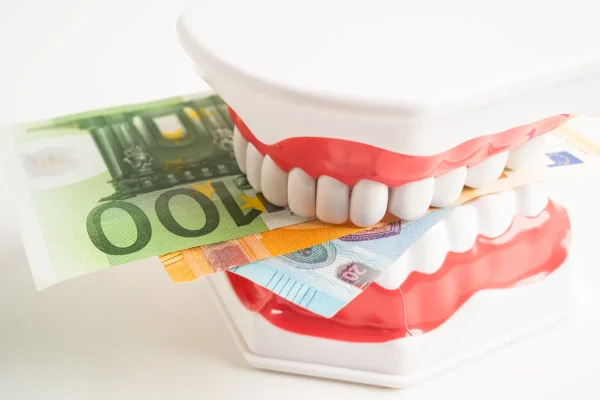
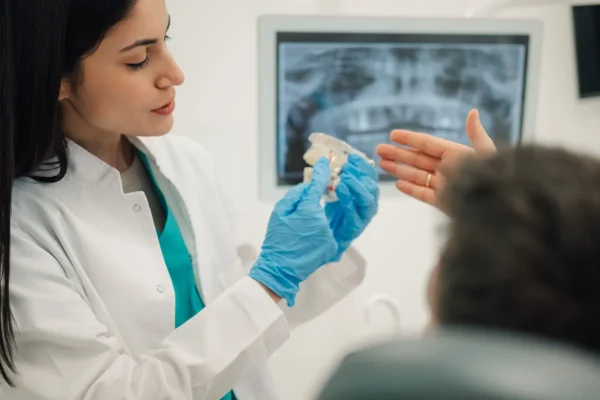
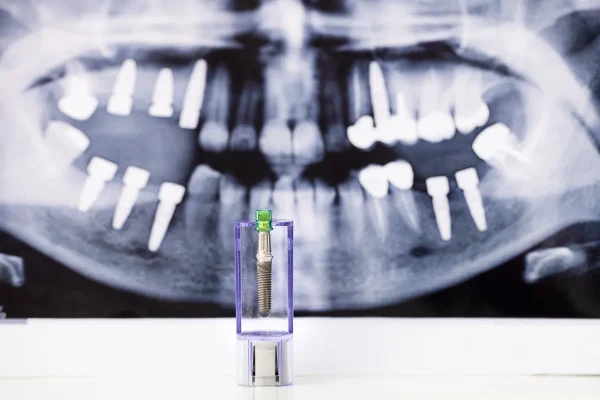
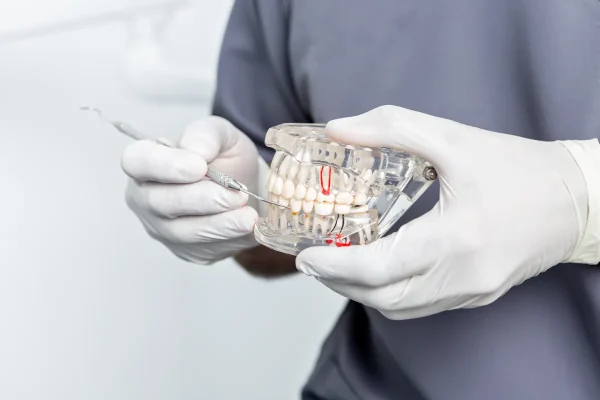

![Dental-Implants-NHS-e1747325783549-1024×915[1] Dental-Implants-NHS-e1747325783549-1024x915[1]](https://dentale-albania.com/wp-content/uploads/elementor/thumbs/Dental-Implants-NHS-e1747325783549-1024x9151-1-r5xyg5ea74oh73k9z5uv5amgw2c45uxhewp2r8hqqo.webp)






